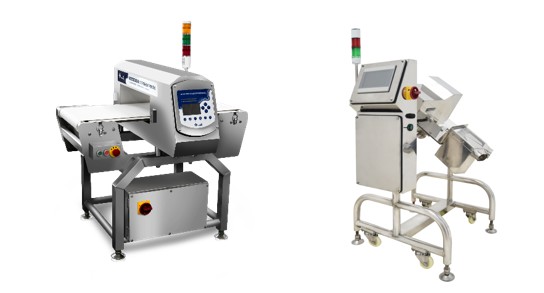Can a metal detector detect food?
A metal detector cannot detect food itself but is specifically designed to detect metal contaminants within food products. The primary function of a metal detector in the food industry is to identify and remove any metal objects—such as pieces of stainless steel, iron, aluminum, or other metallic contaminants—that might have accidentally made their way into the food during processing, packaging, or handling. These metal objects are considered foreign bodies that can pose health risks to consumers or damage equipment.
How Metal Detectors Work in Food Processing
Metal detectors use electromagnetic fields to identify metal contaminants in food products. The metal detector sends an electromagnetic signal through the food product as it passes along a conveyor belt. When a piece of metal passes through the detector, it disturbs the electromagnetic field. The detector detects this disturbance and alerts the system to reject the contaminated product.
Metal Detection in Food Industry
In the food industry, metal detectors are widely used to ensure food safety. Common metal contaminants in food include:
- ●Ferrous metals (e.g., iron, steel)
- ●Non-ferrous metals (e.g., aluminum, copper)
- ●Stainless steel (e.g., from machinery or utensils)
The FDA and other food safety regulatory bodies require food manufacturers to implement metal detection systems to minimize the risk of contamination. Metal detectors are calibrated to detect very small metal particles—sometimes as small as 1mm in diameter, depending on the sensitivity of the system.
Why Metal Detectors Can’t Detect Food Itself
Metal detectors rely on the presence of metallic objects within food. Since food is typically non-metallic, it does not interfere with the electromagnetic signals used by the metal detector. The detector only responds to the presence of metallic contaminants. In other words, metal detectors cannot “see” or “sense” the food itself, only metal within the food.
Techik Metal Detection Solutions
Techik’s metal detectors are designed to effectively detect metallic contaminants in various types of food products, ensuring safety and quality. Techik MD series and other metal detection systems are highly sensitive and capable of identifying ferrous, non-ferrous, and stainless steel contaminants in food. These detectors are equipped with features such as:
- ●Multi-frequency detection: Detecting metal contaminants with high precision, even in products with varying density or packaging.
- ●Automatic rejection systems: When a metal contaminant is detected, Techik metal detectors automatically reject the contaminated product from the production line.
- ●High sensitivity: Capable of detecting very small metal pieces (typically as small as 1mm, depending on the model), Techik metal detectors help manufacturers comply with safety regulations and prevent food safety issues.
While a metal detector cannot detect food itself, it plays a vital role in ensuring that food products are free from metal contaminants. Metal detectors, such as those offered by Techik, are designed to detect foreign metal objects within food, preventing potential hazards and ensuring that food safety standards are met.
